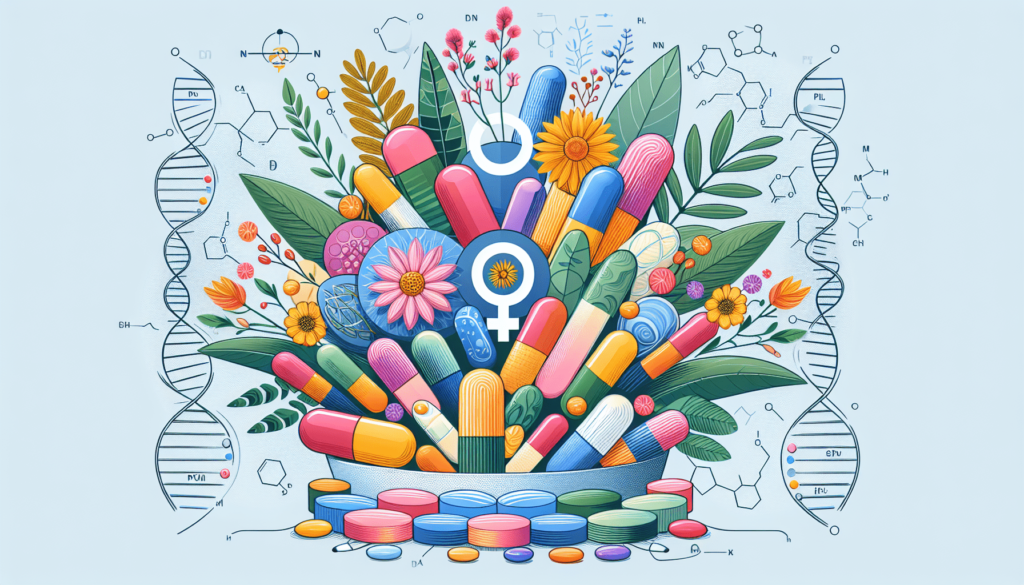If you’ve ever wondered whether there are nutraceuticals specifically designed to support women’s health, you’re not alone. Many women are seeking natural ways to enhance their well-being and address specific health concerns. From managing hormonal imbalances to promoting heart health and supporting bone density, nutraceuticals have gained popularity for their potential benefits. In this article, we will explore some of the key nutraceuticals that may be particularly beneficial for women’s health, offering insights into their potential effects and how they can contribute to a healthier lifestyle. So, let’s uncover the world of nutraceuticals tailored to women’s unique needs and discover how they might positively impact your overall well-being. Yes, there are several nutraceuticals that are specifically beneficial for women’s health. These include vitamins and minerals, omega-3 fatty acids, probiotics, folate, soy isoflavones, black cohosh, cranberry extract, green tea extract, turmeric, and evening primrose oil. In this article, we will explore each of these nutraceuticals in detail, discussing their benefits and how they can contribute to overall well-being.

Calcium
Calcium is an essential mineral that plays a crucial role in maintaining strong bones and teeth. It is particularly important for women, as they are more prone to bone loss and osteoporosis. Adequate calcium intake can help prevent these conditions and reduce the risk of fractures. In addition to its bone health benefits, calcium is also involved in muscle function, nerve transmission, and blood clotting. Good dietary sources of calcium include dairy products, leafy green vegetables, and fortified foods. However, if you struggle to meet your calcium needs through diet alone, supplements can be an effective option.
Iron
Iron is another vital mineral for women’s health. It is responsible for transporting oxygen throughout the body and plays a key role in the production of red blood cells. Iron deficiency is common among women, particularly during reproductive years. Low iron levels can lead to fatigue, weakness, and decreased immune function. To ensure an adequate iron intake, it is important to include iron-rich foods in your diet, such as lean meats, seafood, beans, and fortified grains. Iron supplements may be necessary if you have difficulty meeting your iron needs through diet alone.
Vitamin D
Vitamin D is often referred to as the “sunshine vitamin” because our bodies can produce it when our skin is exposed to sunlight. This vitamin is important for maintaining strong and healthy bones, as it aids in the absorption of calcium. In addition to its role in bone health, vitamin D has also been linked to immune function and mood regulation. Unfortunately, many people, including women, have low vitamin D levels, especially during the winter months or in areas with limited sunlight. In such cases, vitamin D supplements can be beneficial.
Vitamin B12
Vitamin B12 is essential for the formation of red blood cells and the proper functioning of the nervous system. It also plays a role in energy production and the metabolism of proteins and fats. Women, especially those following vegetarian or vegan diets, may be at higher risk of vitamin B12 deficiency. Animal products such as meat, fish, eggs, and dairy are the main dietary sources of this vitamin. If you do not consume enough of these foods, or have conditions that hinder B12 absorption, supplementation may be necessary to maintain optimal levels.
Omega-3 Fatty Acids
Omega-3 fatty acids, specifically EPA (eicosapentaenoic acid) and DHA (docosahexaenoic acid), are a type of healthy fat that has numerous benefits for women’s health. These fatty acids are essential for brain health, as they contribute to the structure and function of brain cells. They have also been shown to reduce inflammation, improve heart health, and support optimal hormonal balance. Rich dietary sources of omega-3 fatty acids include fatty fish like salmon, mackerel, and sardines. However, if you do not consume fish regularly, fish oil supplements containing EPA and DHA can be a convenient alternative.

Probiotics
Probiotics are beneficial bacteria that can help maintain a healthy balance of gut microbiota, which is essential for digestion and overall well-being. Lactobacillus and Bifidobacterium are two common strains of probiotics that are particularly beneficial for women. Lactobacillus helps support vaginal health and can prevent and treat urinary tract infections. Bifidobacterium, on the other hand, aids in maintaining a healthy digestive system and may help alleviate symptoms of irritable bowel syndrome. Probiotics can be found in fermented foods like yogurt, kefir, and sauerkraut or can be taken in the form of supplements.
Folate
Folate, or vitamin B9, is an essential nutrient for women, especially those who are pregnant or planning to conceive. Adequate folate intake is crucial for proper fetal development and can prevent neural tube defects. This nutrient also plays a role in the production of red blood cells and the synthesis of DNA. Good dietary sources of folate include leafy green vegetables, citrus fruits, legumes, and fortified grains. However, supplementation with folic acid may be recommended for women who are at higher risk of deficiency or during pregnancy.
Soy Isoflavones
Soy isoflavones are naturally occurring compounds found in soybeans and soy products. They are classified as phytoestrogens, meaning they have a similar structure to the hormone estrogen. Soy isoflavones have been studied for their potential benefits in managing menopausal symptoms, such as hot flashes and vaginal dryness. They may also have a positive impact on bone health and heart health. However, it is important to note that individual responses to soy isoflavones can vary, and more research is needed to fully understand their effects.
Black Cohosh
Black cohosh is a medicinal herb that has been traditionally used by Native Americans for centuries. It is commonly used as a natural remedy for menopausal symptoms, particularly hot flashes and night sweats. Black cohosh is believed to have estrogen-like effects on the body, which may help alleviate hormonal imbalances. While some studies suggest that black cohosh can be beneficial for menopausal symptoms, further research is needed to confirm its effectiveness and safety.
Cranberry Extract
Cranberry extract is often recommended for urinary tract health, particularly for preventing urinary tract infections (UTIs). It is believed that cranberry extract can prevent bacteria from adhering to the urinary tract walls, reducing the risk of infection. While cranberry extract can be a natural and safe way to support urinary tract health, it is important to note that it should not be used as a substitute for medical treatment if you have an active UTI.
Green Tea Extract
Green tea extract is derived from the leaves of the Camellia sinensis plant and is rich in antioxidants known as catechins. These antioxidants have been shown to have numerous health benefits, including cardiovascular health and weight management. Green tea extract may also have anti-inflammatory and anticancer properties. However, it is important to consume green tea extract in moderation, as excessive intake can lead to caffeine-related side effects.
Turmeric
Turmeric is a spice commonly used in Indian cuisine and has been used in traditional medicine for its anti-inflammatory properties. The active ingredient in turmeric, curcumin, has been studied for its potential health benefits, including reducing inflammation, relieving joint pain, and improving digestion. While turmeric can be included as an ingredient in cooking, supplementation with curcumin may be necessary to achieve therapeutic benefits due to its low bioavailability.
Evening Primrose Oil
Evening primrose oil is derived from the evening primrose plant and is rich in gamma-linolenic acid (GLA), an omega-6 fatty acid. GLA is known for its anti-inflammatory properties and can help alleviate symptoms of premenstrual syndrome (PMS), such as breast pain and mood swings. Evening primrose oil may also have benefits for skin health, as it supports proper hydration and can help reduce inflammation associated with conditions like eczema. However, it is important to consult with a healthcare professional before starting any new supplement regimen.
In conclusion, there are several nutraceuticals that can be specifically beneficial for women’s health. Nutrients such as calcium, iron, vitamin D, and vitamin B12 are essential for maintaining overall wellbeing and addressing specific needs like bone health and energy production. Omega-3 fatty acids have numerous benefits for brain health, heart health, and hormonal balance. Probiotics can support gut and vaginal health, while folate is crucial for pregnant women. Soy isoflavones, black cohosh, cranberry extract, green tea extract, turmeric, and evening primrose oil have all been studied for their potential benefits in various areas of women’s health. It is important to remember that while nutraceuticals can complement a healthy lifestyle, it is always best to consult with a healthcare professional before starting any new supplement regimen to ensure it aligns with your individual needs and health goals.
